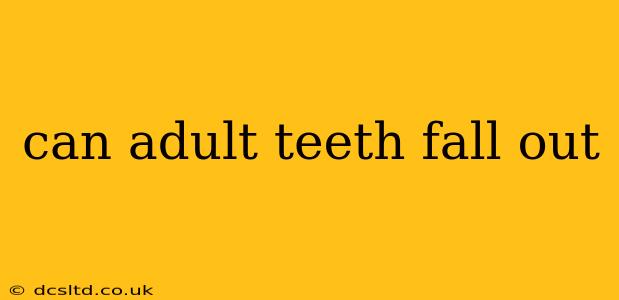Can Adult Teeth Fall Out? Understanding Tooth Loss in Adults
Yes, adult teeth can absolutely fall out. While it's not the same as the deciduous (baby) teeth falling out to make way for permanent teeth, adult tooth loss is a common issue affecting many adults worldwide. Unlike the predictable shedding of baby teeth, adult tooth loss is usually a result of various factors, and it's crucial to understand these causes to prevent it or manage it effectively.
What Causes Adult Teeth to Fall Out?
Several factors contribute to adult tooth loss. Understanding these is key to protecting your oral health.
-
Gum Disease (Periodontitis): This is the most prevalent cause. Gingivitis, the early stage of gum disease, is often reversible with proper oral hygiene. However, periodontitis, the advanced stage, leads to bone and tissue loss around the teeth, making them loose and prone to falling out.
-
Tooth Decay (Dental Caries): Severe cavities can damage the tooth structure to the point where the tooth becomes weak and ultimately falls out or needs extraction. Regular dental checkups and good oral hygiene are essential to prevent cavities.
-
Trauma or Injury: Accidents or injuries to the mouth can result in cracked, fractured, or knocked-out teeth.
-
Aggressive Brushing: While brushing is crucial, overly aggressive brushing can damage tooth enamel and gum tissue over time, contributing to tooth loss.
-
Grinding or Clenching Teeth (Bruxism): This habit puts excessive pressure on the teeth and jaw, leading to wear and tear, potential fractures, and eventual loss.
-
Certain Medical Conditions: Some medical conditions and their treatments, like diabetes, osteoporosis, and certain types of cancer, can weaken the teeth and supporting structures, increasing the risk of tooth loss.
-
Smoking: Smoking significantly increases the risk of gum disease and tooth loss.
-
Poor Oral Hygiene: Neglecting regular brushing, flossing, and dental checkups dramatically increases the likelihood of developing cavities and gum disease.
Can a Loose Adult Tooth Fall Out on Its Own?
A loose adult tooth might fall out on its own, especially if caused by advanced gum disease or significant trauma. However, it's crucial to see a dentist immediately if a tooth becomes loose. They can determine the cause and recommend the appropriate treatment, which may involve stabilizing the tooth, addressing the underlying issue, or, in some cases, extraction.
What Happens if an Adult Tooth Falls Out?
If an adult tooth falls out, you should see a dentist as soon as possible. The best course of action depends on the cause of the tooth loss. Options might include:
- Immediate reimplantation (if possible): In some cases of trauma, immediate reimplantation can be successful.
- Dental implants: These are artificial tooth roots that are surgically placed into the jawbone to provide a stable foundation for replacement teeth.
- Dental bridges: These are artificial teeth that bridge the gap left by a missing tooth, supported by adjacent teeth.
- Dentures: These are removable sets of artificial teeth.
How Can I Prevent My Adult Teeth From Falling Out?
Prevention is key! Here's what you can do:
- Maintain excellent oral hygiene: Brush twice daily, floss daily, and use an antibacterial mouthwash as directed.
- Visit your dentist regularly: Schedule regular checkups and cleanings for early detection and treatment of any issues.
- Eat a healthy diet: A balanced diet rich in fruits, vegetables, and calcium supports overall oral health.
- Avoid smoking: Quitting smoking significantly reduces the risk of gum disease and tooth loss.
- Manage underlying medical conditions: Work with your doctor to manage any medical conditions that could affect your oral health.
- Wear a mouthguard: If you grind or clench your teeth, a mouthguard can protect them from damage.
By understanding the causes of adult tooth loss and proactively taking care of your oral health, you can significantly reduce your risk of losing your teeth and maintain a healthy, beautiful smile for years to come. Remember to consult your dentist for any concerns about your teeth or gums.
